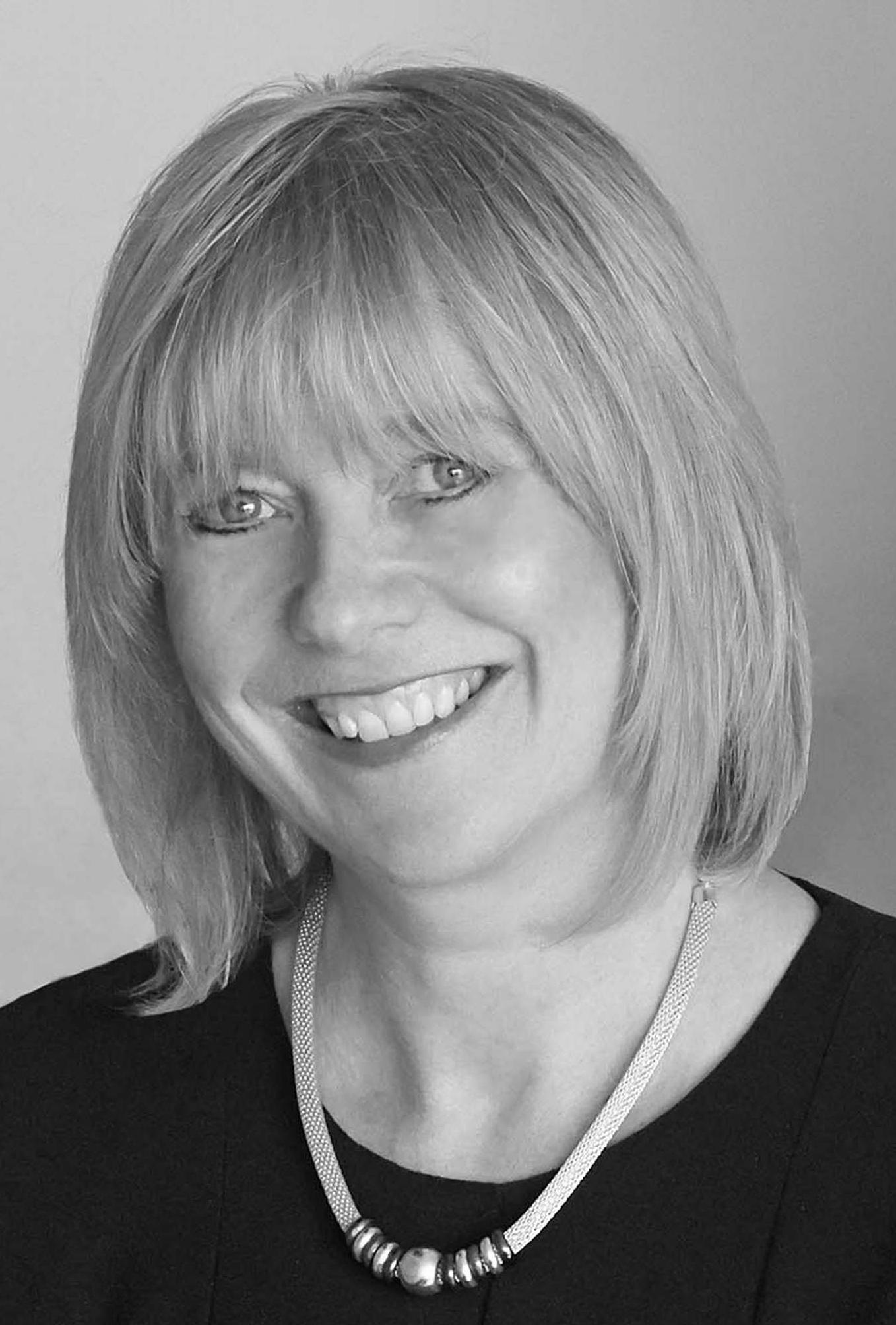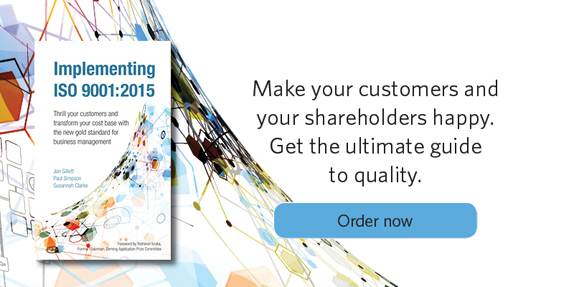Making it in a man’s world. We talk to Susannah Clarke, co-author of Implementing ISO 9001:2015
6 January 2016 by Catherine Holdsworth in Business and finance, Implementing ISO 9001:2015
Engineering and process management are sectors that are dominated by a male workforce. While it may seem to be a ‘man’s world’, Susannah Clarke, co-author of Implementing ISO 9001:2015: Thrill your customers and transform your cost base with the new gold standard for business management has over 30 years’ experience in this industry. As one of the Managing Partner’s at Process Management International, (PMI), Susannah promotes quality management, writes articles, speaks at conferences, coaches and consults on organisational improvement.
In between promoting her book and working at PMI, Susannah kindly answered some of our questions about what it’s like to work in such a male-dominated sector.
 What is it about engineering and process management that appeals to you?
What is it about engineering and process management that appeals to you?
My father is an architect, so I guess the root of it all comes from that. I was amazed by the need to be precise, which at first seemed tedious as a child, but then watching the result, seeing something innovative and creative be built, from those thousands of small details I found quite inspiring. Having said that, in my business life I haven’t always been a fan of process. I struggled to see the link into the service world in which I was working, and in the early days made that common mistake of imagining that process made work restrictive, boring and repetitive.
However as my business grew, and more people had similar jobs to perform, I soon realised that without process, mistakes were made which resulted in unhappy customers and employees spending time on fixing the mistakes as opposed to delivering what the customer wanted. So we started to change that and worked on creating robust processes for the work that was being done and as a result found ourselves able to go to customers and make suggestions, show them how we could do things better, faster and right first time and not only did that make the customer happy, it meant they gave us more work! That appealed to me, naturally and it also appealed to the people working with me because they could think about the art of the possible and not be limited by the amount of ‘fire-fighting’ and problem solving they had to do.
Have you ever come across people who weren’t willing to be directed by a woman?
To be honest no, I haven’t. That’s not to say I haven’t dealt with some difficult people, but inevitably there is more to the problem. I’ve always worked hard to sit down with people, customers and staff, to find out what’s going on, what bothers them and what I can do to help the situation. At PMI (Process Management International) we call it ‘Giving people a good listening to!’ My experience has been that when people really believe you care, when you’re not just paying lip service to their complaint, then they start to work with you and become a returning client. After that, it doesn’t matter whether you are a man or woman they are happy to work with you because they trust you.
There are many women working as business consultants. What made you switch from large companies like NatWest and GSK to the world of engineering and process management?
When I left NatWest I became self-employed and started my own business as a trainer. I’ll be honest, at that time I was very against working for a large company, having gone through Black Monday in the City and seen the departure of many members of staff. So I was very happy to be working as my own boss. My opportunities grew and I had to start sub-contracting work to other trainers in order to service all the customers and then eventually I merged my business with another very similar size business that was also run by a female owner-founder and created a new consultancy, Prelude.
The aim wasn’t to avoid large companies, it was to have the freedom to shape our own company and community – to work with a group of like-minded people who wanted to do the best job for a customer. We could be nimble and adapt to our environment to offer new services. It was during this time that process management became important to us in order to service new and existing customers and continue to grow. We were also flexible in our hiring policy and had several women who were employed part time doing fantastic jobs, helping them through their maternity leave and return to work as it suited them. As a consequence these employees were incredibly loyal to us.
Around 2004/2005 one of my clients asked us to take on managing a service for training administration for a large process improvement/lean six sigma programme they were rolling out with a company called PMI (Process Management International). That was the first time I had worked with the company and I was impressed by how they were organised and the processes they had in place to manage the training. We continued to work together and develop the opportunities beyond that original client. In 2007 I had sold the business and completed my earn out and PMI offered me some consultancy work with them. They also offered me the chance to go on a Lean Six Sigma Green Belt course, which almost blew my mind! I learnt so much in such a short space of time and had so many ‘ah ha’ moments. After that there was no going back.
I’m not saying I don’t get carried away and sometimes forget those principles, but I’m lucky enough now to work with some brilliant consultants who have many years of experience in this field and they are masters at catching me before I shoot off in the wrong direction.
I still think of myself as someone who works with large companies. I just don’t work for them!
How have things changed in the past 30 years for women operating in the manufacturing industries? And what advice would you give to young women entering the world of engineering and process management? (Or business in general?)
We still have a dearth of women in manufacturing and engineering. Read any of the studies on these sectors and they indicate that around one third of the manufacturing workforce and only around 15 to 20% of the engineering workforce is female. Research attributes this to gender pay inequity, work-life balance, insufficient women at the senior executive level and so on, but realistically women only become really aware of these challenges once we have entered industry, don’t we? So isn’t the question more about how do we make a career in these sectors more attractive to women?
Fundamentally I believe we need to start early with the right education in schools and the elimination of stereotypes. When I was 16 I went to a boys grammar school. There were only eight girls in my year, so the school didn’t cater for ‘girl’ subjects. I studied woodwork, graphics and metalwork along with the boys, all the girls did, and I rowed in a coxed four because there weren’t enough of us to make a girl’s team for netball or hockey. I think this helped to break down traditional stereotypes for me. The other thing I found was that from age 11 onwards the boys had specific lesson time allocated to debate current affairs. They had been taught and encouraged to create cohesive, constructive arguments as part of their education. They were preparing the boys from an early age to have a view, be able to express it and learn how to prepare for such discussions. I know we do more of that in our schools today, certainly my daughters are proficient at creating a strong argument! But I still put my head in my hands when I look at the Design & Technology options available to them and their female bias.
What advice would I give them?
There are no limits except those you impose upon yourself. That’s the best advice I could give a woman.
- Understand Systems Thinking, regardless of which sector you work in, whether it is service or manufacturing. Get to know W. Edwards Deming’s System of Profound Knowledge, Systems Thinking, Theory of Knowledge, Variation and Psychology. The four elements are essential to your own and your organisation’s success. Once you understand these and have a decent personal kit bag of tools and methods you can call upon in the different situations or challenges you find yourself, you will be amazed at how good you feel about what you are doing and what you can achieve.
- Be naturally curious rather than jumping to solutions. The more you can ask about what’s going on, using great open questions which avoid making others feel defensive, the more people will open up to you and involve you so that you can learn about the current situation and contribute towards what improvements may be possible in the future.
What have you found the most challenging aspects of working in this field?
There’s so much to learn! But that’s good because I really enjoy learning. However it’s important to remember when to ask for help from others with more knowledge and experience. Influencing others to trust the methods comes a close second. People get into their own habits. They have always done things their way or the way they were told, so persuading them to suspend judgement, try new approaches, change their thinking, is naturally sometimes hard work.
What is the most rewarding part of your job?
There is nothing quite like working with either an individual or team who are struggling and gradually seeing their lights come on as they start to realise what options are open to them, that there are some theories they can have a go at.
There is also something about people realising that they don’t always have to be right first time. I’m not suggesting that people should go off and make huge changes without considering the consequences of course. But helping people realise that they can consciously try small changes, test out a theory or two, see what results they get, learn from the results and then adopt (do it), adapt (change it) or abandon (discard it completely), is very liberating for them. People can get obsessed with things being either right or wrong. I don’t think that’s helpful. I think that prevents people trying new ideas, so giving them an environment, a method, which enables them to make mistakes in a controlled way is amazingly rewarding because they become so enthusiastic about what’s possible by working that way.
Is there anything you think you would have done differently knowing what you know now?
It is absolutely true that “If I knew then what I know now I would have done things differently, deliberately rather than based so much on gut feel.” I started my first business when I was about 22 and I knew how to work hard and was happy to work hard, but I didn’t know anything about systems thinking or process management so I would have made different decisions with data. In 2007 I studied Executive Coaching and Performance Coaching and that has really had a huge impact on my ability to listen, ask questions and coach others and whilst I wasn’t bad at that before, I could have been so much better if I had really developed those skills earlier in my career.

